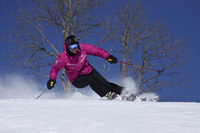Skiers warned to sport shades to steer clear of snowblindness

Skiers and snowboarders planning to take to the pistes this festive season could be heading for a bout of photokeratitis - or snowblindness - if they don't protect their eyes properly when out in the snow and sun.
That's the caution from eye surgeon, Milind Pande. He advises those taking off to the slopes to sport a good pair of sunglasses with full eye coverage to steer clear of the potentially catastrophic combination of snow and sun. Mr Pande, consultant ophthalmologist, Vision Surgery & Research Centre, said: "More than one million Britons go on skiing holidays every year and although we are all familiar with snow and ice, many still succumb to snowblindness, a condition caused by failing to use adequately protective eyewear in high ultraviolet (UV) light conditions like skiing.
"This can be prevented by wearing appropriate sunglasses that filter UVA and UVB light and have side coverage of the eyes, when you're off-piste or even whilst enjoying that outdoor lunch."
Sunlight can also damage the eyes by damaging the macula - the part of the retina that sees fine detail. This is not reversible and is why we are all told to avoid directly looking at the sun during a Solar Eclipse.
Photokeratitis symptoms include painful watering red eyes, swollen eyelids, sensitivity to light and reduced vision due to the irritation to the covering of the cornea.
Mr Pande also has the following advice for anyone suffering from photokeratitis. He said: "This condition typically occurs at high altitudes on highly reflective snow fields. When on a skiing break it is easy to forget to constantly protect your eyes against the harsh effects of a snow and sun combination, especially when there is a good covering of snow and people are keen to make the most of it. Snowblindness is extremely painful, can be a very worrying experience for the sufferer and would definitely put a halt to any skiing holiday. The patient can be helped by eye drops available from a hospital ophthalmic department while lubricating eye drops from a chemist can help to give some relief.
"However, most of all, it is crucial that the patient should avoid the initial cause. Dark glasses and avoidance of bright light will also make the eyes more comfortable. Padding the eye closed for 24 hours is also helpful. If there is severe pain, the patient must seek the opinion of an eye doctor."

